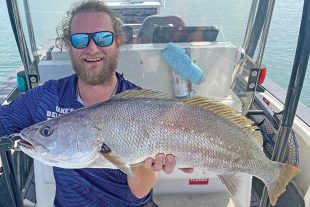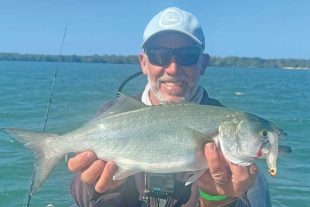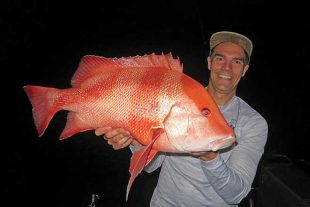Project Kingfish is a collaboration between scientists at the Sydney Institute of Marine Science, various universities and expert recreational anglers to collect urgently needed information and fill knowledge gaps about the reproductive kingfish population, and is enabled by funding from the NSW Recreational Fishing Trusts and the Victorian Recreational Fishing Grants Program.
The problem
Yellowtail kingfish are one of Australia’s most valued fish species.
An estimated 100,000 kingfish are fished recreationally in NSW each year, with an additional 100 tons caught commercially.
Despite their widespread popularity among anglers and their important economic value, relatively little is known about the species.
Major knowledge gaps currently exist about the status of the eastern Australia biological population – which spans South Australia, Victoria, Tasmania, NSW, Queensland and New Zealand – the distribution and behaviour of reproductive individuals, the location of key spawning habitats and how the species recruits to the coast.
As a result, the species has been identified as a top management priority in NSW and nationally.
The solution
A collaboration between scientists and expert recreational anglers to collect information and fill knowledge gaps about the reproductive kingfish population.
More specifically, assessing biological samples and deploying state-of-the-art satellite tracking devices on spawning-sized kingfish – over 95cm total length – to reveal where they go to spawn, how they connect across fisheries jurisdictions and how they recruit to the coast.
The resulting data generated will produce novel insights into the secret lives of kingfish off southeastern Australia.

The science
Project Kingfish uses a range of state-of-the-art approaches including biochemical analyses, satellite tracking technology and computer modelling to produce novel scientific information that will help inform the status of the eastern Australia biological population.
Tracking technology has been successfully used on a plethora of marine animals to gain a deeper understanding of their natural behaviours and effectively inform management and conservation strategies.
The small satellite transmitters – weighing only 57g in air – are deployed on spawning-sized kingfish for a pre-programmed amount of time, up to about 12 months, collecting data on their location, swimming depth, ambient sea temperature and overall activity every second.
When the tag releases from the fish, it floats to the surface and begins transmitting the stored information to satellites.
The light-level data stored by the tag are then used to estimate the daily position of the fish and generate movement tracks, while the temperature and depth profile summaries generated each day provide crucial insights into its habitat preferences.
In addition, the research team uses other approaches such as otolith biochemistry to gain insights into optimal spawning sea temperatures for east Australian kingfish.
Otoliths, the ear bones of fish, grow incrementally as fish get older.
As they grow, they store a record of the environmental conditions for each year of the fish’s life.
Using oxygen stable isotopes, the core of the otolith can be ‘zapped’ to determine at which sea temperature a fish was spawned.
This information will help refine models to identify suitable spawning habitats for kingfish off east Australia and predict subsequent larval recruitment to the coast.
As the effects of climate change and ocean warming keep driving marine species to move south, including kingfish, projects such as Project Kingfish will help produce a new baseline upon which future changes can be identified, and will help gain the insights required to predict future changes in the availability of this species along Australian shores.
Community engagement
Project Kingfish is an active collaboration between scientists and the vibrant recreational fishing community in NSW and across Australia.
The extensive knowledge and skills acquired by expert kingfish anglers enable the Project Kingfish research team to safely catch, study and release the large, healthy, mature kingfish that are sustaining the east Australian population.
Project Kingfish also works to promote sustainable fishing practices and citizen science contributions within the recreational fishing community by sponsoring various kingfish tag and release fishing competitions each year, all in the name of gaining further insights into the population connectivity of the eastern Australia kingfish stock.
Some of the data generated are already revealing extensive connectivity across fishery jurisdictions and informing the management of east Australian kingfish.
 Bush 'n Beach Fishing Magazine Location reports & tips for fishing, boating, camping, kayaking, 4WDing in Queensland and Northern NSW
Bush 'n Beach Fishing Magazine Location reports & tips for fishing, boating, camping, kayaking, 4WDing in Queensland and Northern NSW









